Hanif Abdurraqib
When We Were 13, Jeff’s Father Left The Needle Down On A Journey Record Before Leaving The House One Morning And Never Coming Back
Music works a kind of poetry in us. This poem is like a mix-tape of Hanif Abdurraqib’s memories, complete with a soundtrack that’s as roaring as it is tender. An adult now, he remembers moments of grief and growth in the adults of his childhood, and how Journey’s “Don’t Stop Believin’,” opens up more than just those memories. In a poem that you can almost dance along with, Hanif wraps other people’s griefs — and his own — into language that uplifts.
Letterpress art by Myrna Keliher.
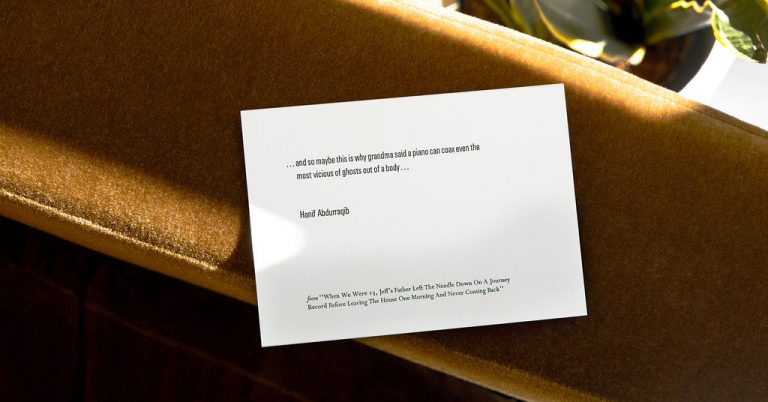
Image by Lucero Torres.
Guest
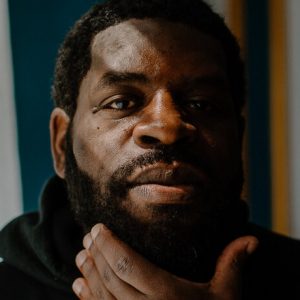
Hanif Abdurraqib is a poet, essayist, and cultural critic from Columbus, Ohio. His poetry has been published in Muzzle, Vinyl, PEN American, and various other journals. His essays and music criticism have been published in The FADER, Pitchfork, The New Yorker, and The New York Times. His books include A Little Devil in America: Notes in Praise of Black Performance, The Crown Ain’t Worth Much, They Can’t Kill Us Until They Kill Us, and A Fortune for Your Disaster. He’s also the host of the podcast, Object of Sound.
Transcript
Pádraig Ó Tuama: My name is Pádraig Ó Tuama, and one of the things I love about music is that when it’s music with lyrics accompanied, those lyrics are a form of poetry. I’m the kind that, years ago, when I would’ve bought a cassette, I would’ve read all the lyrics of the songs before I’d have gotten home to put the cassette in the player. And I’m always interested in how poetry can pick up music by rhyme and by rhythm and by vowel sounds that repeat them, not just for the point of technique but because music is a language of emotion, and it touches much deeper than the individual word can.
[music: ”Praise the Rain” by Gautam Srikishan]
“When We Were 13, Jeff’s Father Left The Needle Down On A Journey Record Before Leaving The House One Morning And Never Coming Back,” by Hanif Abdurraqib:
When We Were 13, Jeff’s Father Left The Needle Down On A Journey Record Before Leaving The House One Morning And Never Coming Back
“and this is why none of us sing along to ‘Don’t Stop Believin’’ when we are being driven by Jeff’s mom, four boys packed in the backseat tight like the tobacco in them cigarettes Jeff’s mom got riding
shotgun with us around I-270 in a powder blue Ford Taurus where four years later Jeff will lose his virginity to a girl behind the East High School football field then later that night his keys and pants in the school pool so that he has to run
home crying to his mother with an oversized shirt and no pants, like a cartoon bear, and the next day when I hear this story, I will think about what it means for someone to become naked two times in one night to rush into the warmth of two
women, once becoming a man and once becoming a boy all over again but right now it is just us in this car with Jeff’s mother, that cigarette smoke dancing from her lips until it catches the breeze
from the cracked front window and glides back towards us a vagabond, searching for a throat to move into and cripple while Neal Schon’s guitar rides out the speakers and I don’t know how many open windows a man has to climb out of in the middle of the night in order to have hands that can make anything scream like that.
nothing knows the sound of abandonment like a highway does, not even God.
in the 1980’s, everyone wrote songs about someone leaving except for this one cuz it’s about how the morning explodes over two people in one bed who didn’t know each other the night before when alone
was the only other option and their homes had too many mirrors for all that shit and so it is possible that this is the only song written in the 1980’s about how fear turns into promise
I think I know this because there is so much piano spilling
all over our laps that we can’t help but to smile since we still black and know nothing can ransack sorrow like a piano.
Jeff’s mother’s hand trembles and still wears a wedding ring so she pulls over to the side of the highway and turns the volume up so loud after the second guitar solo when the keys kick in again that we can barely hear the cocktail
of laughter and crying consuming the front seat until the song fades away and the radio is low again and the ring once on Jeff’s mother’s hand is on the side of the highway beneath us, a sacrifice
and so maybe this is why grandma said a piano can coax even the most vicious of ghosts out of a body.
and so maybe this is why my father would stare at the empty spaces my mother once occupied, sit me down at a baby grand and whisper play me something, child.”
[music: “First Grief, First Air” by Gautam Srikishan]
Hanif Abdurraqib in this poem is geniusly parochial in his own self. You feel like somebody’s just talking and telling a story, and interrupting that story with another story, and then interrupting that story with some music reflection and music journalism, and then reflecting back on their own life, and then telling the point of the whole story that they were telling in the first place.
So there’s characters in this — there’s Jeff and Jeff’s mother. There’s obviously the speaker of the poem, the poet, then the poet’s grandmother and father, and the boys in the back of the car. And then there’s the girl that Jeff was with, and there’s the absent characters, as well, Jeff’s dad and the poet’s mother.
There’s this backing track to the whole poem, this soundtrack to the whole poem — Journey and that song “Don’t Stop Believin’” — and the fact of a particular memory of that being played once, in a car, even though he clearly knew it really well. And then there’s the car, too, the “powder blue Ford Taurus,” and there’s the highway which is named, I-270, and the radio, and that character of the ring that you just see left behind like it’s a soundtrack.
Hanif Abdurraqib is a brilliant poet and brilliant writer about music and music journalist, and a cultural critic as well. And so there’s such engagement with the techniques of music and the techniques of song, all wound together with a story where you’re gonna wonder, what’s gonna happen? What’s Jeff’s mom going to do?
[music: “First Grief, First Air” by Gautam Srikishan]
I feel so much respect and sadness for Jeff’s mom for the difficulties that she’s gone through, and then also the way that she turned up that music and she was that cocktail of laughter and crying, when she sacrificed that ring and drove off, all with four boys crammed into the backseat of the car and with the accompaniment of a cigarette. All of this paints a picture of a person who is surviving her life and has come to a moment of being able to make a decision that is really important, and has done so in public, with the audience of teenage boys.
And I believe her. I feel like, how many of my friends’ mothers were going through things in their life, and we were just teenagers watching? But now, as a man of their age myself, I wonder, what must that have been like, with the accompaniment of kids all round the house, watching and noticing and trying to make sense of everything?
This poem goes back and forth, in trying to make sense. There are ways within which he’s looking at things now, as an adult, that he observed as a child, and going, “Oh, so that’s what that was, and that’s what that was.” And he’s linking that to the way that the music, the brilliance of Neal Schon’s guitar, for instance, is accompanied by a brilliance of human behavior and a brilliance of human character.
[music: “The House You Wake In” by Gautam Srikishan]
This poem tells a story and then interrupts that story with some reflection — reflection on music, reflection on growing up, reflection on reflection. And some of the ways that these reflections come through throughout the poem, they really elevate the everyday storytelling of the poem into these magnificent lines of poetry. So for instance, he’s describing Neal Schon’s guitar “rides out the speakers,” and then, “I don’t know how many open windows a man has to climb out of in the middle of the night in order to have hands that can make anything scream like that.” So here we’re hearing music journalism, but it’s coming back, perhaps, to Jeff’s father — did he climb out a window when he left that record playing?
And then we hear about “nothing knows the sound of abandonment like a highway, not even God.” What a great throwaway line, “not even God.” And the piano “spilling / all over [their] laps … nothing can ransack sorrow like a piano” and how “a piano can coax even the most vicious of ghosts out of a body.” This poem moves from everyday speech into the elevated ways that everyday speech is filled with poetry.
And that’s what I love about this poem. It’s not trying to force poetic reflection into everyday speech, it’s saying that everyday speech often has the most extraordinary forms of poetry in it, if we can just listen.
[music: “The House You Wake In” by Gautam Srikishan]
There’s a question about what it means to grow up. I think what this poem is declaring over and over again is that we need music to accompany us in the memories of these and in the figuring out of these, and that music itself is our memory and brings back, perhaps, the emotion that we can’t connect with by simply recalling the facts of a memory. And the music is music to cry to and to laugh to and to weep to and to dance to, and to bring us to grief in. You know the way the father who’s bereaved and asking his son to play music — “play me something, child” — he’s asking him for music to join us together with family, with friends.
Music in this poem is music that’s used for comfort, but also music that’s turned up loud to blare from a car radio on a highway, to listen to when alone, to listen to with memories, and to listen to in order to come back to the emotional landscape that we still carry in us.
And that, I think, is the invitation of this poem: to listen to the music that’s been the music of your life and to let the emotion of that music sit in your body, and to meet the emotion of the music with the emotion of your memory, and to allow the richness and brilliance of that, stored in the body, to meet each other.
[music: “Into the Earth” by Gautam Srikishan]
“When We Were 13, Jeff’s Father Left The Needle Down On A Journey Record Before Leaving The House One Morning And Never Coming Back” by Hanif Abdurraqib:
When We Were 13, Jeff’s Father Left The Needle Down On A Journey Record Before Leaving The House One Morning And Never Coming Back
and this is why none of us sing along to ‘Don’t Stop Believin’’ when we are being driven by Jeff’s mom, four boys packed in the backseat tight like the tobacco in them cigarettes Jeff’s mom got riding
shotgun with us around I-270 in a powder blue Ford Taurus where four years later Jeff will lose his virginity to a girl behind the East High School football field then later that night his keys and pants in the school pool so that he has to run
home crying to his mother with an oversized shirt and no pants, like a cartoon bear, and the next day when I hear this story, I will think about what it means for someone to become naked two times in one night to rush into the warmth of two
women, once becoming a man and once becoming a boy all over again but right now it is just us in this car with Jeff’s mother, that cigarette smoke dancing from her lips until it catches the breeze
from the cracked front window and glides back towards us a vagabond, searching for a throat to move into and cripple while Neal Schon’s guitar rides out the speakers and I don’t know how many open windows a man has to climb out of in the middle of the night in order to have hands that can make anything scream like that.
nothing knows the sound of abandonment like a highway does, not even God.
in the 1980’s, everyone wrote songs about someone leaving except for this one cuz it’s about how the morning explodes over two people in one bed who didn’t know each other the night before when alone
was the only other option and their homes had too many mirrors for all that shit and so it is possible that this is the only song written in the 1980’s about how fear turns into promise
I think I know this because there is so much piano spilling
all over our laps that we can’t help but to smile since we still black and know nothing can ransack sorrow like a piano.
Jeff’s mother’s hand trembles and still wears a wedding ring so she pulls over to the side of the highway and turns the volume up so loud after the second guitar solo when the keys kick in again that we can barely hear the cocktail
of laughter and crying consuming the front seat until the song fades away and the radio is low again and the ring once on Jeff’s mother’s hand is on the side of the highway beneath us, a sacrifice
and so maybe this is why grandma said a piano can coax even the most vicious of ghosts out of a body.
and so maybe this is why my father would stare at the empty spaces my mother once occupied, sit me down at a baby grand and whisper play me something, child.”
[music: “Don’t Stop Believin’” by Journey]
Lily Percy: “When We Were 13, Jeff’s Father Left The Needle Down On A Journey Record Before Leaving The House One Morning And Never Coming Back” comes from Hanif Abdurraqib’s book The Crown Ain’t Worth Much. Thank you to the publisher, Button Poetry, who gave us permission to use Hanif’s poem. Read it on our website at onbeing.org.
Poetry Unbound is: Gautam Srikishan, Chris Heagle, Erin Colasacco, Eddie Gonzalez, Lilian Vo, and me, Lily Percy.
Our music is composed and provided by Gautam Srikishan and Blue Dot Sessions.
This podcast is produced by On Being Studios, which is located on Dakota land. We also produce other podcasts you might enjoy, like On Being with Krista Tippett, Becoming Wise, and This Movie Changed Me. Find those wherever you like to listen, or visit us at onbeing.org to find out more.
[music: “Don’t Stop Believin’” by Journey]
Books & Music
Recommended Reading
The On Being Project is an affiliate partner of Bookshop.org and Amazon.com. Any earnings we receive through these affiliate partnerships go into directly supporting The On Being Project.






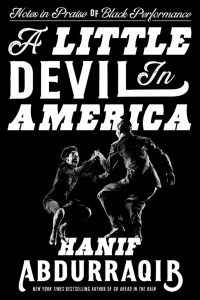
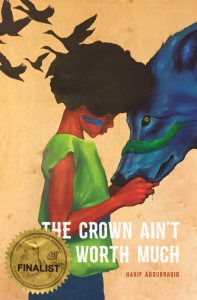

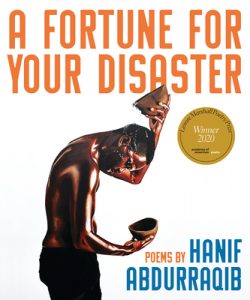

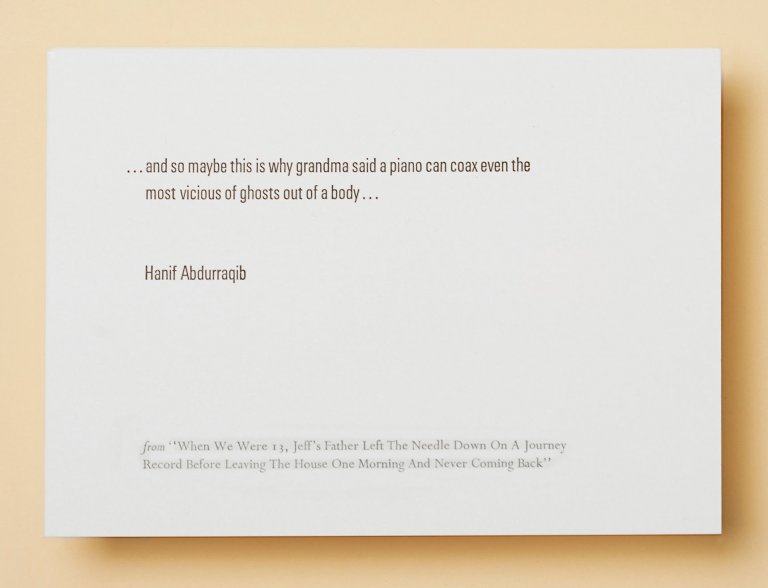
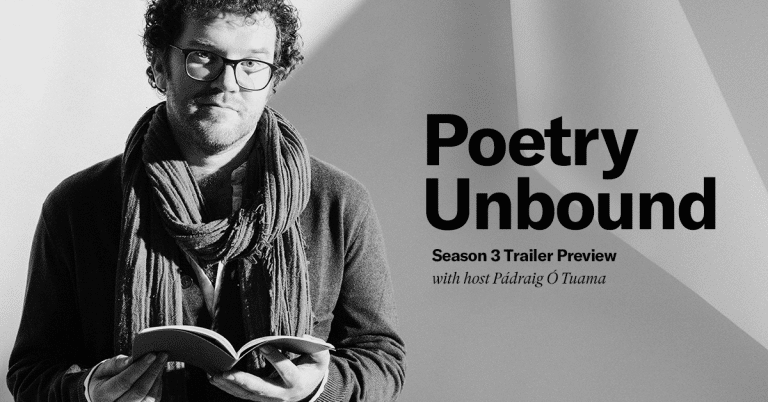
Reflections